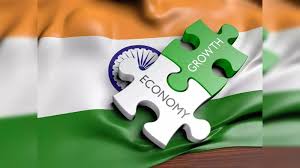India continues to solidify its position as the fastest-growing major economy, recording a steady growth of 6.7 per cent over the next three years, including the current financial year, according to a World Bank report released on Tuesday. In the fiscal year (FY) 2023/24, growth is estimated to have surged to 8.2 per cent, marking a 1.9 percentage point increase from earlier projections in January.
Global Economic Context
Global Growth Projections
The World Bank’s latest Global Economic Prospects report paints a cautious picture for the global economy. It projects global growth to hold steady at 2.6 per cent in 2024, with a slight increase to an average of 2.7 per cent in 2025-26. This is significantly lower than the pre-COVID-19 decade average of 3.1 per cent.
Impact of COVID-19 on Global Growth
The forecast indicates that by 2024-26, countries representing over 80 per cent of the world’s population and global GDP will experience slower growth compared to the pre-pandemic era. This slowdown underscores the long-lasting impact of COVID-19 on global economic dynamics.
South Asia’s Economic Outlook
Regional Growth Trends
Growth in the South Asia region (SAR) is expected to decelerate from 6.6 per cent in 2023 to 6.2 per cent in 2024. This moderation is primarily attributed to a slowdown in India’s growth from a high base in recent years. Nevertheless, regional growth is forecasted to maintain a steady pace of 6.2 per cent in 2025-26.
Country-Specific Growth
- Bangladesh: Growth is anticipated to remain robust but slower than previous years.
- Pakistan and Sri Lanka: Both countries are expected to see strengthening economic growth.
India’s Economic Performance
Current Fiscal Year Growth
In FY 2023/24, India’s economy grew by an impressive 8.2 per cent, a significant improvement from earlier estimates. This growth is driven by strong public and private investment, robust consumption, and favorable external conditions.
Future Growth Projections
Despite the high growth rate in FY 2023/24, India’s growth is expected to moderate to a steady 6.7 per cent per year for the next three fiscal years, starting in FY 2024/25. This anticipated moderation is due to a slowdown in investment from a high base. However, investment growth is projected to remain strong, bolstered by both public and private sectors.
Investment Trends
Public Investment
India’s government continues to prioritize infrastructure development, which is a key driver of economic growth. Massive investments in transportation, digital infrastructure, and renewable energy are expected to sustain high levels of public investment.
Private Investment
Private investment is also forecasted to remain robust, supported by favorable policy measures, improved business sentiment, and an overall positive economic outlook.
Sectoral Analysis
Technology and Innovation
India’s technology sector remains a powerhouse, contributing significantly to economic growth. Continued advancements in IT services, software development, and digital innovation are driving productivity gains and economic expansion.
Manufacturing and Industry
The manufacturing sector is witnessing a resurgence, supported by initiatives like “Make in India.” Increased foreign direct investment (FDI) and government incentives are fostering industrial growth and job creation.
Agriculture
Agriculture continues to be a vital sector, providing livelihoods to a significant portion of the population. Efforts to modernize agricultural practices and improve supply chain efficiencies are expected to enhance productivity and rural incomes.
Challenges and Opportunities
Economic Challenges
- Inflation: Managing inflation remains a key challenge for policymakers. Rising prices of essential goods can erode purchasing power and dampen consumption.
- Global Uncertainties: Geopolitical tensions and global economic uncertainties pose risks to India’s growth trajectory.
Opportunities for Growth
- Digital Economy: The rapid adoption of digital technologies presents significant opportunities for economic transformation. E-commerce, fintech, and digital services are poised for substantial growth.
- Sustainable Development: Investments in renewable energy and sustainable practices can drive long-term growth while addressing environmental concerns.
Policy Measures
Monetary Policy
The Reserve Bank of India (RBI) plays a crucial role in maintaining economic stability through prudent monetary policies. Balancing growth and inflation is a key priority for the central bank.
Fiscal Policy
Government spending on infrastructure, social programs, and economic reforms are essential for sustaining growth. Fiscal policies aimed at boosting investment and consumption are critical for maintaining economic momentum.
India’s economic prospects remain bright, with the country poised to remain the fastest-growing major economy in the coming years. Despite anticipated moderation, a steady growth rate of 6.7 per cent is projected, driven by robust investment and favorable economic conditions. As global and regional dynamics continue to evolve, India’s resilience and growth potential make it a standout performer on the global stage.








